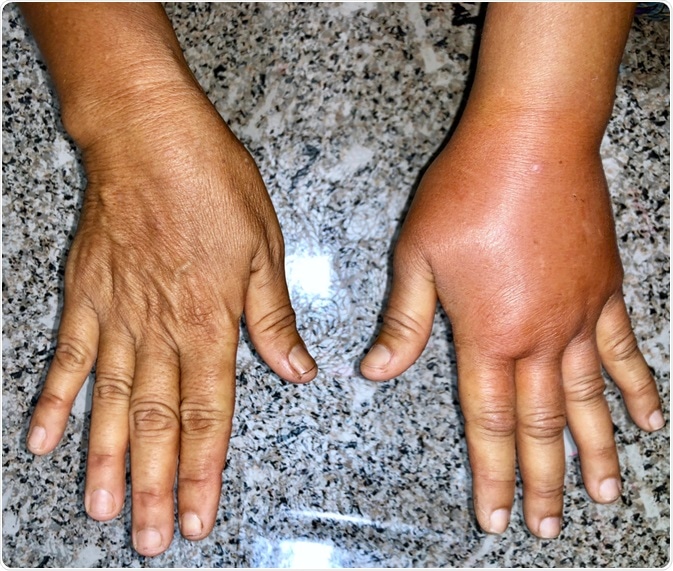Lymphedema is a health condition that involves the retention of fluid in localized areas of the body, leading to swelling of tissues. Various areas of the body can be affected by lymphedema and are at an increased risk of infection as a result of the condition.
The early and chronic symptoms of lymphedema have been separated into two sections below, as they are quite distinct. In the early stages, the skin usually remains soft while containing the swelling, whereas significant changes occur in later stages.
Lymphedema Symptoms and Treatments
Affected areas
Lymphedema most commonly affects the limbs and extremities including:

Image Credit: Zay Nyi Nyi / Shutterstock.com
Additionally, the breast, chest, and shoulders are commonly involved in breast cancer survivors who have previously undergone treatment for cancer. This may present several months or years following the therapy.
Early symptoms
The severity of lymphedema can vary dramatically between patients, depending on the degree of swelling and other symptoms. In some cases, the changes are mild and are barely noticeable for patients, whereas in other cases, dramatic changes affect the use of the affected limbs.
Symptoms of acute lymphedema may include:
- A feeling of heaviness, tightness, or fullness
- Restricted range of motion and flexibility
- Aching or discomfort
In mild cases, patients may notice that it is more difficult to fit into clothing than usual, particularly sleeves, pants, or a bra. Additionally, accessories such as a ring, watch, or bracelet may feel tighter than usual. The skin usually remains soft and elastic in the early stages and raising the affected area often helps to relieve swelling and associated discomfort.
It is also common for people with lymphedema to experience recurring infections due to the changes in the lymphatic system.
Chronic symptoms
When lymphedema continues for an extended period of time with insufficient treatment, the symptoms can become more severe, and chronic changes to the skin around the affected area may become noticeable.
Symptoms of chronic lymphedema may include:
- Skin discoloration and reddening
- Fibrosis - hardening or thickening of the skin
- Verruca hyperplasia
- Hyperkeratosis
- Papillomatosis
- Elephantiasis and deformity
When lymphedema is present for a number of years, the skin can adapt to the changes in size and cause permanent deformity to the area.
Differential symptoms
It is important to recognize that the edema that results from venous insufficiency is a separate health condition from lymphedema and is associated with different symptoms.
However, when this health condition goes untreated, it may progress to a combined disorder that involves both the venous and the lymphatic system. The standard treatment for such cases is the same as treatment for lymphedema.
References
Further Reading
Last Updated: Apr 21, 2021